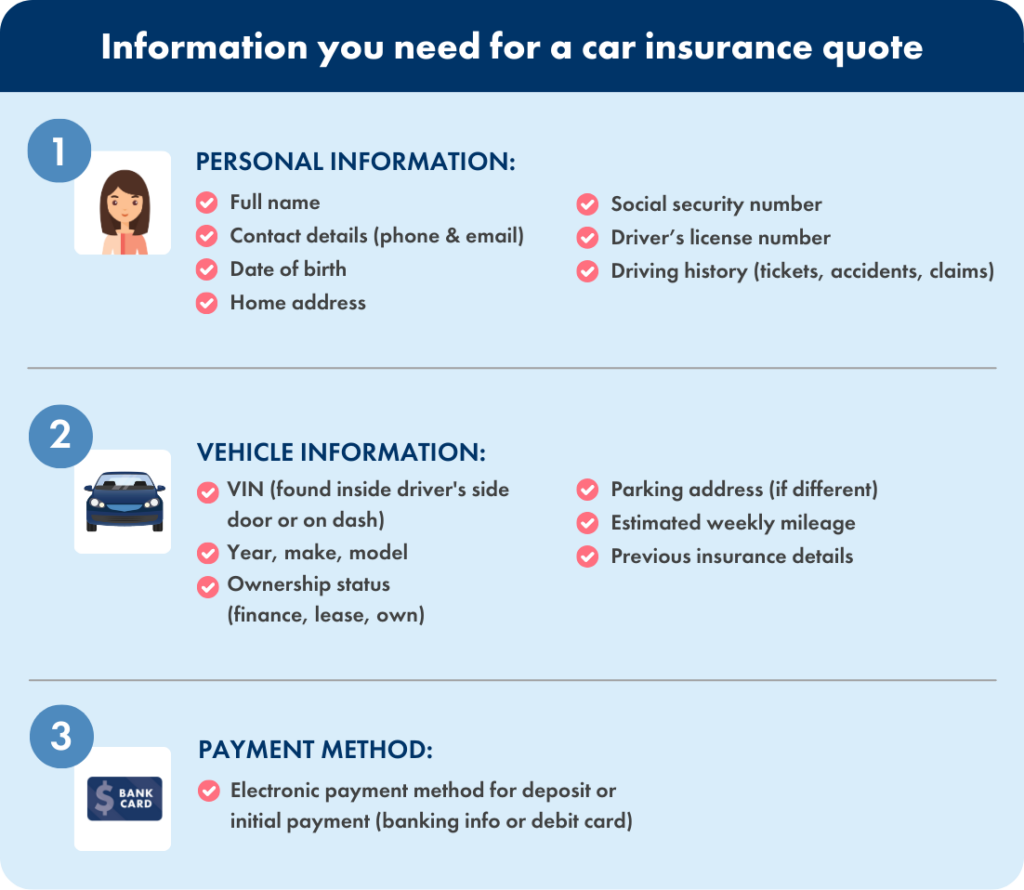Over the last twenty years, the car insurance industry has exploded alongside the increasing number of cars on the road. With so many coverage options out there, it’s easy to feel overwhelmed.
But don’t worry! With a bit of savvy and the right approach, you can breeze through the auto insurance shopping choices and find the perfect insurance plan for you, especially if you’re wondering how to get car insurance before buying a car.
According to Statista, there were 286 million cars on the road in the U.S. in early 2023, a 7% increase from 2018. Considering that the average American driver spends an hour behind the wheel and drives 30 miles a day, having good car insurance coverage is a smart move.
Let’s look at the steps you should be aware of if you’re shopping for car insurance.
First, evaluate your insurance needs
Before jumping into the market, pause for a moment to consider your insurance needs. You’ll need to weigh factors like your car’s value, your driving habits, who else might be driving the car, crime rates where you live, and any additional coverage you might need. Thinking about all this lays the groundwork for finding the right insurance policy.
Which car insurance coverage is considered essential?
When shopping for car insurance, begin with the basic coverage: liability, collision, and comprehensive. Then, based on your vehicle’s conditions and your finances, decide which is most important to have. It’s perfectly OK if you feel you need them all.
Here’s what the basics cover:
- Liability coverage handles damages you cause to others in an accident, covering their medical bills and property damage.
- Collision coverage covers repairs to your car after a collision, regardless of fault. If your car is newer, you might want more collision protection than if you’re driving an older car.
- Comprehensive coverage protects your car from non-collision incidents like theft, vandalism, or natural disasters.
Now think about additional coverages you may want
Beyond the basic car insurance coverage types mentioned earlier, consider additional protection options to see if they suit your lifestyle and driving habits:
- Medical Payments Coverage (MedPay): Covers medical expenses resulting from accidents for you and your passengers, regardless of fault.
- Personal Injury Protection (PIP): Similar to MedPay but can also cover lost wages, childcare expenses, and funeral costs.
- Uninsured/Underinsured Motorist Protection: Provides coverage if you’re in an accident caused by a driver without insurance or with insufficient coverage.
- Rental Reimbursement: This program reimburses the cost of a rental car while yours is being repaired due to a covered accident.
- Roadside Assistance: Offers support if your car breaks down, including services like towing, battery jump-starts, and tire changes.
Know how deductibles affect premiums
Your budget plays a big part in how to shop for auto insurance. Consider a monthly premium that fits your budget, but also think about how much you can afford for a deductible—the amount you’d have to pay out of pocket before your insurance covers a claim.
Deductibles help determine your insurance costs. For instance, if you choose a $500 deductible and file a $2,000 claim, you’ll pay $500, and your insurance will cover the rest.
Typically, opting for a higher deductible means lower monthly premiums. That’s because you’re agreeing to shoulder more of the cost if something happens. Insurance companies like this, so they’ll make your monthly payment less than if you opted for a lower deductible.
But don’t set your deductible too high. While it might save you money on your monthly bill, if something happens and you can’t afford the deductible, you may find yourself in hot water.
So, strike a balance between what you pay monthly and what you can manage out of pocket if the need arises. Also, think about discounts that might be available if you pay the annual premium all at once rather than in monthly increments.
What do you need to get car insurance for the first time?
To streamline the process and help you (and your insurance broker) make more informed decisions, use our checklist to make sure you’re well-prepared:
- Personal Information: Provide details such as your full name, date of birth, address, and contact information.
- Driver’s License: Be sure to have a copy of your valid driver’s license ready for verification.
- Vehicle Information: Gather details about your vehicle, including make, model, year, VIN (Vehicle ID Number), and current mileage.
- Vehicle Registration: Have a copy of your vehicle registration easily accessible.
- Driving History: Be prepared to discuss your driving history, including any past accidents or violations. Don’t hide anything, as it’ll be revealed in your records anyway.
- Current Policy Info: If you’re switching providers, have details of your current insurance policy available for reference — like provider name and account number.
- Financial Information: You may be asked about your financial status, including income and assets, as this may impact your coverage options.
- Additional Drivers: If there are other drivers in your household who will be covered under the policy, gather their information as well.
- Any Special Circumstances: If you have unique circumstances that may affect your insurance needs, such as a teenage driver or a history of claims, be prepared to discuss these with your insurance provider.

Take time to research providers and compare rates
Researching insurers and comparing prices are crucial steps in the car insurance shopping process. It’s important not to just settle for the first insurance company you talk to, the one with the lowest price, or the one with the funniest ads. With many new insurance companies entering the market, it’s important to consider all options.
While newer or unknown brands may be perfectly fine, some companies may lack extensive customer reviews, so it’s wise to explore a variety of providers to determine which you’re comfortable with from a price, coverage, and service standpoint.
You can take a do-it-yourself approach, which involves filling out a lot of online forms, waiting for responses, and trying to carefully compare your offers, but let’s be honest, that can be a long and tedious project.
Alternatively, you can rely on Guided Solutions – the best website to get auto insurance quotes. We’re not insurance providers, we’re brokers who shop and compare rates from reputable insurance companies on your behalf. With Guided Solutions, you get faster turnaround, offers from top-tier insurers, easy online form submissions, access to discounts, and personalized expert advice tailored to your needs.
Check out their customer service and claims processes
A reliable insurance provider will offer great customer service and an easy claims process with quick follow-through. Look into the insurer’s reputation for customer support and learn how their claims filing works, as well as the level of personalized help they offer to settle claims.
Guided Solutions has long-term experience with some of the best insurers in the U.S., so we can help here as well, steering you away from a provider with a poor track record of providing excellent support when it’s needed most.
Understand your car insurance policy details
Once you’ve received offers from several different insurance providers, it’s time to examine each policy’s specifics. Carefully read the terms and conditions, paying close attention to details such as deductibles, annual or monthly fees, coverage inclusions and exclusions, payment limitations, penalties, and any special clauses.
Again, if you’re working with Guided Solutions, we can help you navigate through your offers so that you fully understand your options before making a decision.
Ask about car insurance discounts
Taking advantage of available discounts can help you reduce your insurance costs while still getting the necessary coverage, but some insurers may not tell you about them upfront, so make sure you ask. They can include:
- Bundling: Many insurance companies offer significant savings on premiums when you bundle auto and home insurance.
- Annual Payment: Ask if you can pay your premium annually instead of monthly. Some insurers reward policyholders for paying upfront by lowering their overall costs.
- Student Driver: If you have a student driver on your policy who maintains good grades, you may be eligible for a discount.
- Low Mileage: If you don’t drive your car frequently, you may be at a lower risk for accidents, and you could qualify for potential savings on premiums.
Additionally, there may be other discounts available based on your car’s safety features, your driving history, and whether you’ve taken any defensive driving courses. The auto insurance experts at Guided Solutions will discuss these discounts with you to determine which ones you qualify for.
Now it’s time to make a decision about car insurance
With all your research done, it’s time to make a well-informed choice. You can tackle it solo or lean on Guided Solutions for a helping hand. We’re not your average insurance company – we’re here to make getting car insurance coverage a breeze. Our team of experts handles everything, from finding great deals to customizing coverage just for you.
And we don’t stop there – we’ll even assist you in securing your policy and go through the paperwork together, making sure you’re crystal clear and confident in your decision.
We’re ready when you are!
If you’ve read this far, you know that shopping for car insurance coverage demands diligence and attention to detail. By following the steps outlined above, you should be well on your way toward making a great choice. And with the help of our experts at Guided Solutions, you’ll get there even faster.
How long does it take to get car insurance?
We know you’re busy, so whether this is a new policy or you’re looking to revisit an existing policy, we’ll make sure to get a great quote back ASAP and get you covered quickly without sacrificing quality. Fill out our online quote form or call (833) 791-4719 for immediate assistance.









